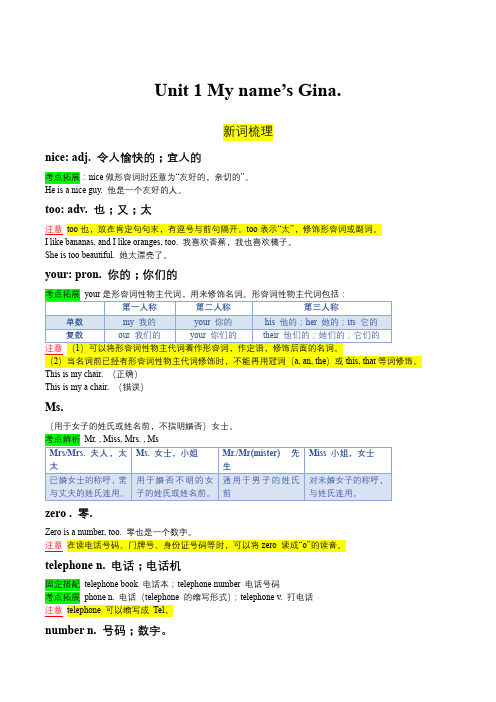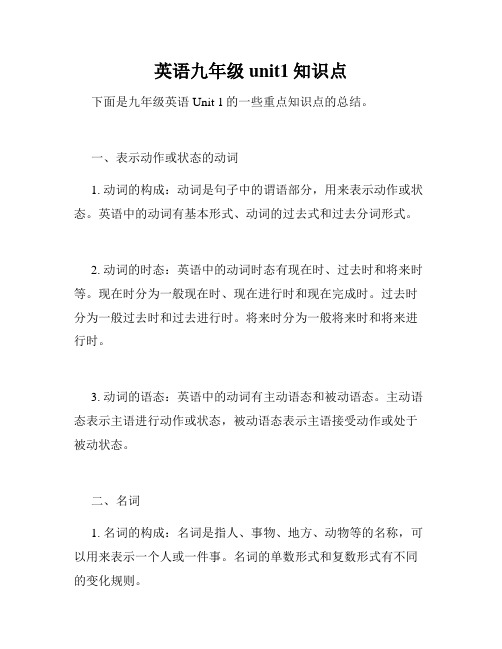unit 1复习整理
Unit1 单元复习知识清单

Unit1单元复习知识清单一、同步知识梳理一、词汇Words(有关)历史的名词形式是history。
阶梯(uchhelesofmanyheroesarecelebratedbytheybirthdaywithabigas庆祝圣诞节celebrateone'sbirthday庆祝某人的生日celebrateaweddinganniversary庆祝结婚纪念日celebrateavictory/success庆祝胜利【知识拓展】celebrationn庆祝,庆典他父亲在他生日那天为他举办了一个生日庆祝会。
敌人简和萨拉以前曾是好朋友,但现在却是仇敌。
【反义】朋友愚蠢的多么愚蠢的行为啊!【近义】dulladj迟钝的,呆滞的foolishadj愚蠢的,傻的,笨的【反义】机灵的,聪明的intelligentadj聪明的,伶俐的你必须准时到这儿。
Doeshehavetotaehispianolessons他必须上钢琴课吗?拿某人开玩笑玛丽是班里最胖的学生,我们总是拿她开玩笑。
【友情提示】与maefunof…意思相近。
他们经常取笑凯丽。
可改写为:TheyalwaysmaefunofKally请注意,fun是个不可数名词,不可误用为maefunsof。
等待我等车已等了半个小时了。
Healwayshastobewaitedfor他老是要人等他。
【知识拓展】waitu ebac,gobac意为“回来,回去”。
return还可作“归还”讲,等于givebac,所以return不能与bac相连。
你的母亲一会儿就回来,Donotforgettoreturnmyey不要忘记还我的钥匙。
Enter=comeinto,gointo意为“进入”,所以enter不能与into相连。
Unit 1单元知识梳理(1)

Unit 1 My school重点单词:first floor第一楼second floor第二楼playground 操场library 图书馆art room美术教室music room 音乐教室teachers’office教师办公室computer room计算机教室homework家庭作业class班级forty四十习惯搭配及短语on the first\second floor 在一\二楼next to紧邻;在…旁边go to…去…This way,please.这边请。
welcome to…欢迎来到…how many多少Excuse me. 打扰了。
重点句型:☆1.--Where is the teachers’office∕art room? 教师办公室∕绘画教室在哪里?--It’s on the first∕second floor. 它在一楼∕二楼。
☆2.--Is this∕that a teacher’s office? 这∕那是教师办公室吗?--Yes,it is. ∕No,it isn’t. 是的,它是。
∕不,它不是。
☆3.The teachers’office is next to the library. 教师办公室挨着图书馆。
☆4.--Do you have a library? 你们(学校)有图书馆吗?--Yes, we do. ∕No,we don’t.语法点:特殊疑问句Where’s the+事物? ……在哪里?及其回答:It’s+表地点的介词短语。
它……一般疑问句:--Do you have+某物?你\你们有……吗?肯定回答:--Yes,I\we do.否定回答:--No,I\we don’t.Is this∕that…? 这∕那是…?肯定回答:--Yes,it is.否定回答:No,it isn’t.。
Unit 1 知识点梳理

Unit 1 My name’s Gina.新词梳理nice: adj. 令人愉快的;宜人的考点拓展:nice做形容词时还意为“友好的,亲切的”。
He is a nice guy. 他是一个友好的人。
too: adv. 也;又;太注意too也,放在肯定句句末,有逗号与前句隔开。
too表示“太”,修饰形容词或副词。
I like bananas, and I like oranges, too. 我喜欢香蕉,我也喜欢橘子。
She is too beautiful. 她太漂亮了。
your: pron. 你的;你们的This is my chair. (正确)This is my a chair. (错误)Ms.(用于女子的姓氏或姓名前,不指明婚否)女士。
zero . 零.Zero is a number, too. 零也是一个数字。
注意在读电话号码、门牌号、身份证号码等时,可以将zero 读成“o”的读音。
telephone n. 电话;电话机固定搭配telephone book 电话本;telephone number 电话号码考点拓展phone n. 电话(telephone 的缩写形式);telephone v. 打电话注意telephone 可以缩写成Tel。
number n. 号码;数字。
注意number 用于数字前可以被缩写为No. ,其后应用阿拉伯数字。
first adj. 第一。
Sunday is the first day of a week. 星期天是一周的第一天。
考点拓展(1)first 的反义词:last adj. 最后的;末尾的(2)first 还可以做副词,意为“首先”You must finish your homework first. 你必须先完成你的家庭作业。
last adj. 最后的;末尾的固定搭配last name 姓;at last 终于;最后考点拓展(1)last还可以用作副词,意为“最后;上次”He came last in the race. 赛跑中她是最后一个到达的。
unit1知识梳理

Unit1知识梳理名词:1)母鸡2)猪3)鸟4)鸭5)日记6)活动7)自行车8)建筑物房子______________ 9)商人10)差别,差异11)顶部,表面12)一把雨伞_______ 13)小山1.Tom fed some _________(猪) on the farm yesterday.2.How many___________(母鸡) are there on your farm?3.There are many new_____________(build) in my neighborhood.umbrella bird trader different4.These ___________ are from the USA.5.Look! There are many__________flying in the sky.6.It’s raining outside. Please take the____________, Alice.7.Can you tell me the ______________between the two pictures?动词:1)好像,似乎2)决定3)尝试,设法4)想知道5)等候6)不喜爱1.The American girl ___________(try) to study Chinese, but she still got a C in the test.2.They decided __________(go) on vacation to Hong Kong.3.Living in the village is boring, so she____________(like) it.4.Look! Lily and her mother _____________(wait) for the bus over there.5.Mrs Wang asked us________________________(写日记) in English every day.形容词,副词:1)精彩的2)不多有些3)最多,大多数4)有趣的,令人愉快的5)湿的6)足够的(地)____________ 7)饥饿的8)像...一样,如同9)厌倦的,烦闷的enjoy most hungry boring wet1.________of my friends are from the countryside.2.I have nothing to do on rainy days, so I often feel ___________.3.The boy was so ___________that he ate two big hamburgers.4.I think children will have a(n) ______________vacation there.5.The _______clothes will dry in the sun soon.代词:1)某人2)任何人3)每人,人人4)某事/物5)任何事/物6)每件事,一切东西7)没有一件东西8)某地9)在任何地方10)我自己11)你自己你们自己11) 在...下面,到...下面1.Something (be) wrong with my watch. It doesn’t work.( )2.Is there in the shop?A.special somethingB.special anythingC.something specialD.anything special ( )3.—Tom,supper is ready.—I don’t want to eat,Mum.I’m not feeling well.A.EverythingB.anythingC.somethingD.anything( )4.—Would you like to eat?—Yes,I am very hungry.A.somethingB.anythingC.nothingD.everything短语:1.相当多,不少2.当然,自然3.给...的感觉,感受到4.因为5.度假6.拍照7.Long time no see 8.have a good time9.一些特殊的东西10.任何特殊的东西11.足够的食物12.足够的湿13.most of the time 14.决定做... 15.尝试做16.喜欢做...enjoy 17.in the past18.到达某地in/ to/reach 19.等火车20.忘记做... 21.太多的人22太多的钱23.太便宜24.另外两个小时/25.给某人买某物/跟踪训练Because of feel like go on vacation quite a few keep a diary1.Sue is outgoing and friendly, so she has_______________friends at school.2.Our teacher asks us to __________________to practice out written English every day.3.They_________________they were birds on the plane.4.--Where did you___________________last summer, Mary?-- I went to Sanya with my parents.5. He was late for work__________________the bad weather.( )6.He gets up every morning.He’s never late for school.A.enough earlyB.enough lateC.early enoughte enough( )7.He has things to do every day.A.too muchB.much tooC.too manyD.many too( )8.I late the bad weather yesterday.A.am,becauseB.am,because ofC.was,becauseD.was,because of( )9.Tom decided volleyball on Sunday.A.to playB.playC.playedD.playing( )10.We who is going to teach us next term.A.thinkB.wonderC.hopeD.believeB.。
Unit 1 复习要点

Unit 1 复习要点一、短语。
1. by making flashcards 通过做单词抽认卡2. ask sb for help 向某人求助3. read aloud 朗读4. that way (=in that way) 通过那种方式5. improve my speaking skills 提升我的会话技巧6. for example 例如7. have conversations with friends 与朋友对话8. get excited about 为…高兴,激动9.end up speaking in Chinese 以说汉语结束对话10.keep an English notebook 记英语笔记11.spoken English 英语口语12.make mistakes in sth 在…犯错误13.get the pronunciation right 使发音准确14.practise speaking English 练习说英语15.first of all 首先16. to begin with 刚开始,起初ter on 随后ugh at sb. 嘲笑某人19.take notes 记笔记20.enjoy doing sth. 喜欢干某事…21.write down 写下,记下22.look up 查找,查阅23.make up 编造,虚构,24.deal with 对待,处理,解决25..be angry with 生某人的气26.stay angry 生气27.go by 消逝28.regard…as…把…当做…plain about sth. 抱怨某事30. with the help of 在…的协助下pare…to…把…和…作比较32.break off 中断,突然终止33.not…at all 根本不,全然不34.make complete sentences 做完整的句子35.be afraid of sth/doing sth害怕某事be afraid to do sth. 害怕做某事36.have trouble(in)doing sth 做....有困难37.study for a test 为考试用功38. make vocabulary lists 做单词表39. too …to…太…而以致于不能做40.watch English-language TV 看英语电视41.take a lot of grammar notes 记大量的语法笔记42.look up the words in a dictionary 查字(词)典43.feel soft 摸起来柔软。
英语九年级unit1知识点

英语九年级unit1知识点下面是九年级英语Unit 1的一些重点知识点的总结。
一、表示动作或状态的动词1. 动词的构成:动词是句子中的谓语部分,用来表示动作或状态。
英语中的动词有基本形式、动词的过去式和过去分词形式。
2. 动词的时态:英语中的动词时态有现在时、过去时和将来时等。
现在时分为一般现在时、现在进行时和现在完成时。
过去时分为一般过去时和过去进行时。
将来时分为一般将来时和将来进行时。
3. 动词的语态:英语中的动词有主动语态和被动语态。
主动语态表示主语进行动作或状态,被动语态表示主语接受动作或处于被动状态。
二、名词1. 名词的构成:名词是指人、事物、地方、动物等的名称,可以用来表示一个人或一件事。
名词的单数形式和复数形式有不同的变化规则。
2. 可数名词和不可数名词:可数名词可以用数词或冠词来修饰;不可数名词通常不能与数词连用,只能用量词来表示。
三、形容词和副词1. 形容词的构成:形容词是用来表示事物性质或状态的词汇,可以修饰名词或代词。
2. 副词的构成:副词是用来修饰动词、形容词或其他副词的词汇,用来表达程度、方式或时间。
大部分副词是通过在形容词后面加上-ly构成。
四、代词1. 人称代词:人称代词分为主格和宾格两种形式。
主格代词作主语,宾格代词作宾语。
2. 物主代词:物主代词用来表示所属关系,包括形容词性物主代词和名词性物主代词。
3. 反身代词:反身代词用作宾语,表示某人自己做某事。
五、冠词和介词1. 冠词的用法:冠词分为定冠词和不定冠词,用来限定名词。
定冠词有the,不定冠词有a和an。
2. 介词的用法:介词用来表示名词或代词与其他单词之间的关系,常用于表示时间、地点、方向、目的等。
六、连接词和从句1. 连接词的分类:连接词分为并列连词、关系连词和从属连词。
并列连词用来连接两个相同的成分,关系连词用来引导定语从句,从属连词用来引导时间、条件、原因、目的、方式、结果等从句。
2. 从句的种类:从句分为名词性从句、定语从句和状语从句。
高中英语必修一第一单元知识点

高中英语必修一第一单元知识点一、词汇与短语1. 词汇- 基础词汇:问候、介绍、数字、颜色、职业、日常用品等。
- 扩展词汇:描述人物特征、表达喜好、日常活动相关词汇。
2. 短语- 问候用语:Hello, Hi, Good morning/afternoon/evening.- 自我介绍:My name is..., I come from..., I am...- 询问与回答:What's your name?, How old are you?, Where do you come from?- 表达喜好:I like/don't like..., I'm interested in..., My favorite...二、语法1. 时态- 一般现在时:表示经常发生的动作或状态。
- 一般过去时:表示过去发生的动作或状态。
2. 句型- 肯定句、否定句和疑问句的构成。
- 特殊疑问句的构成:Who, What, Where, When, Why, How。
3. 代词- 人称代词主格和宾格的使用。
- 物主代词形容词性和名词性的区别。
4. 介词- 常用介词:in, on, at, for, with, by, of, about, from, to, from...to...三、听力与口语1. 听力- 理解日常对话和短文。
- 抓住关键信息,如人名、地点、时间和数字。
2. 口语- 进行简单的自我介绍和日常对话。
- 描述人物和事物,表达个人意见和喜好。
四、阅读与写作1. 阅读- 阅读并理解简短的文章和对话。
- 通过上下文猜测生词的意思。
2. 写作- 写简短的自我介绍。
- 描述人物、地点或事件。
五、文化知识1. 了解英语国家的基本文化习俗。
2. 学习与日常生活相关的英语国家节日和传统。
六、学习策略1. 制定学习计划,合理安排学习时间。
2. 利用多种资源和工具辅助学习,如词典、录音和在线资源。
Unit 1 单元知识速记-(人教新目标)

Unit 1 单元知识速记词汇精讲1. quite a fewa few 意为“一些;若干”,相当于some。
few意为“几乎没有”,后跟可数名词复数形式。
quite a few 意为“相当多;不少”,相当于many,后跟可数名词复数形式。
如:①There are a few pictures in the book.书里有一些图画。
②He is a quiet boy and he has few words.他是一个安静的男孩,几乎不说话。
③He has a few good friends here.他在这里有一些好朋友。
2. enough(1) enough作形容词,意为“充足的,充分的,足够的”,可作表语或定语,作定语时,可放在名词的前面或后面。
例如:The food is enough for the trip. 用于这次旅行的食物足够了。
I have enough time to watch TV. 我有足够的时间看电视。
(2) enough还可作副词,意为“足够地”,这时enough需放在所修饰的形容词或副词后面。
例如: The young man is strong enough to carry the heavy bag.那个年轻人足够强壮能搬动重包。
【拓展】(1) enough…to do sth. “有足够的……做某事”。
例如:I don’t have enough time to eat lunch.我没有足够的时间吃午饭。
(2) …enough to do…可以同too…to…或so…that…结构互相转换。
例如:He isn’t old enough to go to school.= He is too young to go to school.= He is so young that he can’t go to school.他太小而不能上学。
3. seemseem是系动词,意为“好像,似乎,看来”,后常接形容词。
- 1、下载文档前请自行甄别文档内容的完整性,平台不提供额外的编辑、内容补充、找答案等附加服务。
- 2、"仅部分预览"的文档,不可在线预览部分如存在完整性等问题,可反馈申请退款(可完整预览的文档不适用该条件!)。
- 3、如文档侵犯您的权益,请联系客服反馈,我们会尽快为您处理(人工客服工作时间:9:00-18:30)。
Unit 1 Greetings and Small Talk
Useful expressions (掌握如何在口语中使用)
You look very familiar to me.
Do you remember me?
Have we met before?/ Have you met … before?
Have you ever been to…? I’ve never been to…?
What a coincidence!
I never forget a face.
I’m not from around here.
- What have you been up to? (最近忙什么?) – Not much.
I’d like you to meet…/ This is…/ Let me introduce …
It’s nice to meet you./ It’s a pleasure to meet you./ Very pleased to meet you.
Socio-Cultural points
Greeting customs around the world (可以用英语介绍)
(bow, shake hands, kiss, hug, nod your head, lower your eyes, first/last names, left/right hand, titles, gesture, body language, disrespectful, etc..)
Invitations and receptions (p.16 speaking)
Recommended reading
TEXT A
TEXT C paras 1-3
Key words & phrases (要求:掌握英文意思和中文意思,找出课文中例句和课后练习例句,并且自己造句)
Text A
matter vi. be very important
misinterpret v. explain or understand in a wrong way
sensitive adj.
… isn’t everything.
non-verbal actions
be culturally sensitive to…
in coins/bills
give sb. a hug/ hug sb.
get off on the wrong foot
a firm handshake
Text B
involve v. include
value v.
agreeable adj. very pleasant
indicate v. show
Text C
elevate v.
unique adj.
validity n. (valid adj.)
claim v., n.
victim n.
criticize v.
abolish v.
attribute n.
be elevated to (sth.) 被提高,被誉为
be unique (to sb.) 为…所特有/独有
put up with, be patient with 忍受
be indulgent to 对…纵容
be intolerant of 对…不宽容
give the game away 露出马脚
have validity/have no validity, be without foundation 站得住脚,站不住脚,毫无根据
be bestowed with 被赋予,被授予(be lavishly bestowed with)
be critical of 批评,对…有意见
criticize sb/sth for sth 因…指责/批评某人
accuse sb. of sth. 因某事指控某人
stick to (sth.) 坚持,遵守
be a victim of 遭受
be out of proportion to (sth) 过分夸张,不相称
be frightened of 害怕
be confident with 对…有信心
object to 反对
see…as…把…看做…
thoroughly hypocritical posture
radio phone-in。
